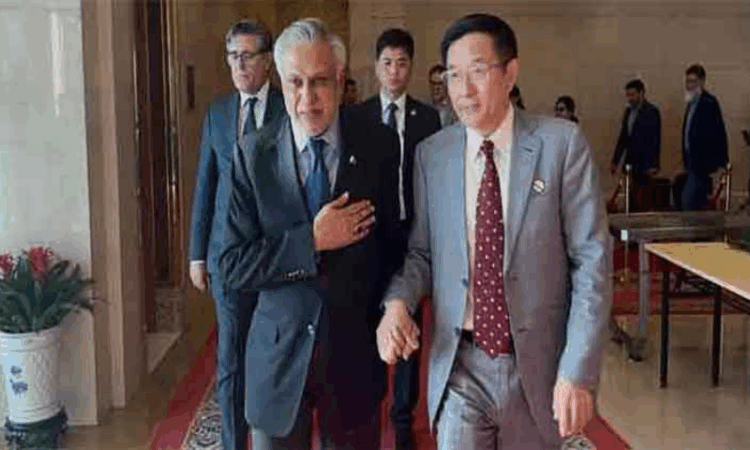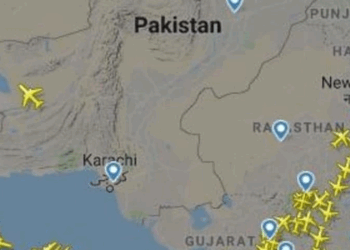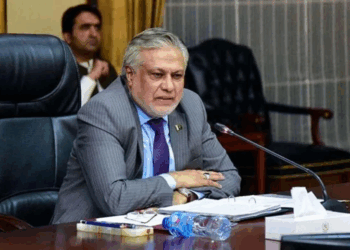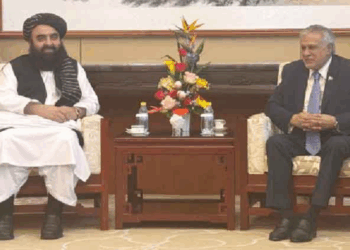Islamabad/Beijing, May 19, 2025: Pakistan’s Deputy Prime Minister and Foreign Minister Ishaq Dar arrived in Beijing on Monday for a three-day official visit at the invitation of Chinese Foreign Minister Wang Yi, amid heightened regional tensions following a recent military standoff between Pakistan and India.
According to state broadcaster Radio Pakistan, Dar was warmly received at the airport by senior Chinese officials and Pakistan’s Ambassador to China, Khalil Hashmi. The visit, scheduled from May 19 to 21, comes at a critical time in South Asia’s geopolitical landscape.
The diplomatic mission follows last week’s ceasefire agreement between Islamabad and New Delhi, brokered with U.S. intervention after days of military escalation triggered by the Pahalgam attack in Indian-administered Kashmir. India accused Pakistan of orchestrating the assault—an allegation Islamabad strongly denies.
On May 6 and 7, Indian airstrikes targeted areas in Punjab and Azad Kashmir, resulting in civilian casualties. In response, Pakistan claimed to have shot down five Indian jets. Subsequent cross-border drone activity and limited strikes prompted urgent international engagement, culminating in a ceasefire on May 10.
During his visit, Dar is expected to engage in high-level discussions with his Chinese counterpart to assess the evolving regional dynamics and their implications for peace and stability. The two leaders will also review the full spectrum of Pakistan-China bilateral relations and deliberate on regional and global developments of shared interest.
In a statement, Pakistan’s Foreign Office emphasized the importance of the visit as part of a series of high-level exchanges reflecting the strong and enduring strategic partnership between the two countries.
Afghanistan’s interim Foreign Minister, Amir Khan Muttaqi, is also expected to be in Beijing, potentially participating in trilateral talks focused on regional security and peace.
Speaking to reporters before his departure, Dar highlighted the “iron-clad” relationship between Pakistan and China, describing Beijing as a critical economic and strategic partner. He noted that this visit follows two recent telephonic conversations with Wang Yi, during which the Chinese foreign minister extended the invitation.
Dar indicated that his engagements in Beijing would address a wide range of topics, including bilateral cooperation, regional security, the India-Pakistan crisis, and broader global affairs. He also reiterated Pakistan’s stance that India’s recent accusations—including threats against nuclear sites—were part of a dangerous disinformation campaign aimed at diverting attention from its domestic challenges.
In her regular briefing, Chinese Foreign Ministry Spokesperson Mao Ning said Dar’s visit reflects Islamabad’s commitment to deepening ties with Beijing. “China and Pakistan are all-weather strategic cooperative partners. The two countries maintain close, high-level exchanges and cooperation,” she stated.
She added that China is ready to strengthen strategic communication and cooperation with Pakistan, aiming to build a “closer China-Pakistan community with a shared future in the new era.”
Commenting on the India-Pakistan situation, Mao Ning reiterated Beijing’s neutral stance and its willingness to play a “constructive role” in promoting a lasting ceasefire and maintaining regional peace. “India and Pakistan are both important neighbors. China attaches great importance to relations with both,” she said.
China has consistently backed Pakistan in international forums and has made significant economic contributions through infrastructure and development initiatives, notably the China-Pakistan Economic Corridor (CPEC), which Islamabad considers vital to its economic revival.
Dar’s visit underscores the strategic importance of Pakistan-China ties and the role both nations aim to play in stabilizing South Asia amid growing volatility.








